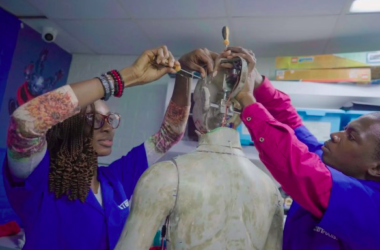The level of human imitations by machines is taking another turn that may almost defy the impossibility of mimicking human behavior.
Erica is one of those machines created by Hiroshi Ishiguro, Director of Intelligent Robotics Laboratory at Osaka University in Japan.
Erica can understand natural human language, make involuntary movements like eye blinking and eye movements when communicating with humans, and help humans perform assistance jobs like; payment of expenditures, saving money, and check balance.
Researchers are currently rebranding Erica to laugh as a human when engaged in musing, triggering conversation. Laughter is one of the obvious characteristics that indicate the autonomic nature of the human mind, which comes as instinct, implying that laughter is an unlearned human behavior.
Laughter creates an atmosphere that strengthens the bond of friends and flavours conversations. Researchers are trying to extend the humor nature to robots so as to induce robots to exhibit human characters.
So, robots like Data (a robotic comedian) would no longer just tell jokes or perform tasks but would laugh reasonably and appropriately.
Although interesting, the task may be arduous because Erica and other robots with similar features would be programmed to emulate normal conversation and laugh when necessary.
This project attempts to make communications that stimulate empathy between real humans and human-like machines, creating a more natural chat, detecting emotions and the manner of laughter for the occasion.
Having a robot that laughs foolishly or out of proportion would be too awkward, so a loud or mild laugh would be different for every situation.
One of the tricks of this laughing robot is to respond to humor and laughter from humans and act accordingly. This was tested at Kyoto University, where a human interacted with Erica, who was tele-controlled in a separate room by Researcher Divesh Lala.
The reports from the experiment showed that Erica never muses or laughs every time a human laughs; she often responds with a chuckle, behaving almost like a human.
The researchers garnered training data from a dating dialogue between the student and Erica.
It may seem like future robots would be able to have casual chats and interact with humans just as friends.
Still, Prof Daucha Wachter of Oxford University drew a line by her statement that a robot or algorithms will never be able to understand humans nor the meaning of laughter.
However, they might get involved in chat just as humans do perhaps in 10 to 20 years, said a team member.
Please visit us @GoSpeedHub on Facebook, Instagram, and Twitter for more information.
Photo By Nicolas Daliche









